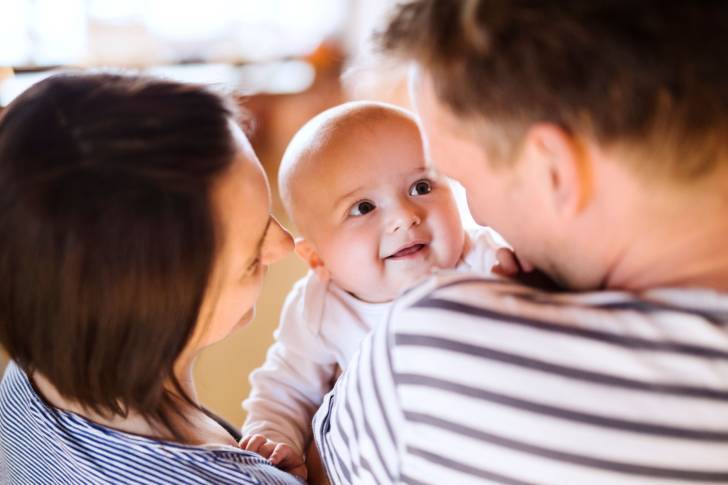How to Understand Each Other Better and Avoid Conflict
- Pregnancy is a very special — and often challenging — time for both partners. While the woman experiences the physical and emotional changes firsthand, the man is often more on the outside looking in, with a different perspective.
- But the partner also plays a vital role during pregnancy and after the birth!
With understanding, open communication, and loving involvement, you can use this time as a couple to grow closer and strengthen your relationship.
This also applies to the time after the birth and the early days of parenthood. - Here, you’ll find helpful tips on what you — as a woman — can do to support and nurture your relationship.
Changing Perspectives: What Pregnancy Looks Like from a Man’s Point of View
When everything still feels abstract and hard to grasp
For many men, pregnancy is something quite abstract in the beginning — regardless of whether the pregnancy was planned or unplanned. Since they don't experience the changes directly in their own body, it can be hard for them to fully realize what’s actually happening.
That’s completely normal — and sometimes even similar for women, especially before the pregnancy becomes noticeable through physical symptoms.
While the woman gradually grows into this new state — through things like nausea, a growing belly, or the baby’s first movements — the man misses out on this direct physical experience.
To build an emotional bond with the baby, he often needs different kinds of impulses or moments.
Women usually feel that connection sooner, as they sense the pregnancy through their own bodies from the very beginning.
That’s one of the natural differences between men and women — just how nature designed it. :)
Because of this, some women may find their partner’s behavior confusing or even distant at first. But often, it’s simply uncertainty — he may not know how to respond to the pregnancy or how to relate to his partner, who is suddenly going through something he cannot feel or fully understand.
That said, expectant fathers can absolutely develop an emotional connection to the pregnancy and the baby. A key moment for many men is seeing the first ultrasound image. Suddenly, something becomes real: There’s a tiny human growing. At that point, many men become especially interested in measurable details — like the baby’s size or weight. Facts like these help make the unimaginable more concrete — and can open the door to an emotional connection with the baby.
Relationship Tips:
- Consciously involve your partner in your pregnancy! Take him along to your prenatal appointments, show him your maternity record, and tell him how the baby is growing. Let him touch your belly, feel the baby’s movements, and talk to the baby! By the way: babies can hear voices and sounds at an early stage – so they’ll also become familiar with Daddy’s voice.
- It can also help a man to actively do something – for you and his child. Perhaps he’d like to help set up the nursery, assemble furniture, or attend childbirth preparation classes with you. These shared experiences or searching for baby names together help him form an emotional bond with the child and strengthen your relationship as a couple. What might suit him?
- Above all, don’t blame your partner for experiencing the pregnancy differently than you do. He will form his own connection with your child – it may look different from yours, but it is no less valuable.
The Bond Between Mother and Child
For many men, it can be challenging to witness how deeply connected their partner is with the baby. While the woman experiences this bond as something natural and beautiful, the man may feel unsure or left out. Some men begin to withdraw simply because they don’t know how to get involved. Often, a man has a deep and caring respect for the connection between mother and child. Sometimes, he steps back because he wants to protect that special bond — wanting to do everything “right.” But this very care can also lead to feelings of insecurity.
Some women also feel completely fulfilled during pregnancy — even overjoyed, as if they’re in “seventh heaven.” Yet for some men, this new joy can trigger hidden fears: “Am I still important? Does our relationship still matter?” Women often don’t notice these doubts if they’re completely immersed in their own happiness. At the same time, they may misinterpret their partner’s quietness or distance as a lack of interest — when in reality, he may be feeling unsure of his place in this new dynamic.
Relationship Tips:
- Talk openly with your partner about your feelings and needs. Let him know that he’s still your number one — even now, when so much of your focus is on the baby.
- Show him that you want him by your side and how he can support you in concrete ways.
For example, how comforting it is to be held, or how small gestures — like a neck massage or carrying the grocery bags — really lift you up.
Because the truth is: He wants to support you! - Allow him to step into the role of supporter and protector — in a way that fits you, your relationship, and his personality.
It can help to gently make him aware that he’s just as important for your child, and that he has meaningful responsibilities, too. - Trust him. Encourage him. And don’t forget to thank him now and then — for being patient through mood swings, or for simply standing by you when nausea or exhaustion take over.
He is a vital source of strength.
Becoming Parents While Staying a Couple
Even during pregnancy, much of the focus naturally shifts to the baby — and that’s completely normal. Especially with the first child, everything begins to rearrange: woman and man are no longer just a couple — they’re becoming parents. But the real challenge is this: staying a loving couple while becoming a parenting team.
It’s important to stick together during pregnancy so that you’re strong and connected when it’s time to face the new responsibilities of parenthood.
Especially if the man can’t yet fully imagine what it will be like to be a father, having a strong anchor becomes essential.
And that anchor is your partnership. Seeing yourselves as a team, taking on this new role together, and nurturing your connection as a couple — all of that can give him the sense of security and confidence he needs for what lies ahead. And honestly, the same probably goes for the woman too :)
Relationship Tips:
- Pregnancy is a time of transition — not only into parenthood, but also into a new dynamic within your relationship. To avoid drifting apart, it’s important to consciously make time for each other as a couple — not just as future parents.
- How about planning a romantic dinner, a short getaway, a night out, or simply doing something you both enjoyed before the pregnancy? Moments like these can help you stay connected and remind you of the bond you share.
- Talk openly about your hopes and fears — without judging one another.
Show each other affection, even when daily life gets hectic. - And most importantly: celebrate this time together! Don’t lose sight of the bigger picture in the middle of everyday worries. You're about to take on a beautiful new role — and you can shape it in a way that fits you as a couple.
 2476647529 | Halfpoint | shutterstock.com
2476647529 | Halfpoint | shutterstock.com
A Change of Perspective: How Men View Birth and the Time After
By Her Side – A Steady Support
While many women approach childbirth with mixed emotions, they usually have a deep inner sense that they will get through it.
During pregnancy, most women come to trust their bodies and realize that much of what happens during birth follows a natural rhythm — like a well-practiced system.
Men, on the other hand, often find themselves in more of an observer’s role. This can make them unsure of how best to support their partner during labor and birth.
Many men feel helpless because they can’t take away the pain or physical strain their partner is going through. But this is exactly where their strength lies:
Being present. Offering calm. Being her steady support.
For many men, pregnancy and birth are moments when they see their partner in a completely new light. They witness how she rises to the challenge — with strength, courage, and endurance — and are filled with admiration and respect. This deep appreciation can actually strengthen the emotional bond between partners.
And even if the man sees his partner as incredibly strong — maybe even capable of handling everything on her own — it still means a great deal to her to know that he’s by her side.
Relationship Tips:
- Let your partner know in advance what matters most to you. Encourage him to simply be there for you — his presence is often the most valuable thing he can give.
- Tell him what his presence during the birth means to you, and how much it will help. Men can offer a great sense of security through small gestures — like breathing with you, playing familiar music in the delivery room, or having your favorite snacks on hand.
- You might also consider creating a birth plan together with your midwife. That way, both of you can feel more confident and prepared. Many women find it comforting when their partner is positioned near their head during labor — able to maintain eye contact and hold their hand.
- Even though many fathers today are present at the birth, there may be reasons why he chooses not to be.
What’s important is that the two of you talk openly and honestly about it — so you can make the decision together, with mutual understanding.
Finding the Role of Fatherhood
Having a first child changes life in ways that are hard to fully grasp beforehand — for both women and men.
But even with a second or third child, much about daily family life remains unpredictable.
While women often undergo a deep, physical and emotional preparation for motherhood through pregnancy and birth, men may find it harder to connect with their role as fathers early on.
In a way, women have a kind of “head start” in confidence and connection.
During pregnancy, a woman experiences profound changes. She can feel that her body is already equipped with everything the baby will later need — from nourishment through breastfeeding to natural, intuitive care. These experiences often give mothers a deep sense of inner security and connection with their child.
After birth, the mother remains the baby’s primary attachment figure, especially during the postpartum period.
Close physical contact, breastfeeding, and simply being near the baby help form a powerful bond.
Mother and baby need time to find their own rhythm. But it’s a good thing that more and more fathers want to be actively involved right from the start — and support their partners. For that to work well, the close mother-child unit needs to gently open up, so the father can build his own bond with the baby.
At the same time, it's important for both parents to continue seeing themselves as a team — not just as caregivers, but also as a couple.
Sometimes, mothers may enjoy their time with the baby so much that they unconsciously leave less space for the father.
Or they may feel unsure whether their partner can do things “the right way.”
Such situations can make fathers feel left out, insecure, or even hurt. But here's what’s important to remember: Even if mothers have a bit of a “head start” and continue to play a key role, fathers can quickly learn how to connect with their child too.
With patience, trust, and encouragement, dads develop their own sense of how to care for the baby — in their own unique way.
Relationship Tips:
The birth of your child isn’t just the beginning of a new life — it’s also a powerful moment for you as a couple to grow even closer.
By supporting and respecting one another, you can overcome the challenges ahead and discover yourselves in new ways as parents.
- Involve your partner after the birth, for example when the midwife visits.
He will quickly learn how to hold the baby or how to change a diaper — he just needs the opportunity to try and grow into it. - Give him time to bond with the baby, too — for instance, through skin-to-skin contact by lying with the baby on his bare chest.
Especially in the early days, your baby needs a lot of warmth and closeness — and fathers can provide that just as well. - Tell your partner how much you need him right now, and let him know how he can support you.
- If your partner doesn’t seem very interested in the baby at first, speak to him gently about it.
Try to understand how he’s feeling, and explain how it makes you feel.
Continue to encourage him and show him your love — often, what fathers need most is reassurance and trust.
Every Phase Has Its Own Magic
Not every man immediately feels at ease during the baby stage. Some fathers develop a stronger bond later — during toddlerhood — when they can play, roughhouse, or go on little adventures with their child. And that’s completely okay. Just as not every mother thrives exclusively in the baby stage: Some enjoy the toddler years more, while others find their stride during the teenage years. There is no “right” or “wrong” phase to come into your own as a parent. What matters most is recognizing and appreciating these personal preferences — in yourself and in each other.
For a child, it is incredibly valuable to receive affection and love in different ways — from both mother and father. This diversity enriches the child’s development and shows them that love can be expressed in many forms. Different doesn't mean less valuable — in fact, the distinct ways of caring from each parent come together to form a stable foundation that will support the child throughout life.
The child also senses and observes how their parents treat each other: when mother and father love each other, show affection, and support one another.
That gives the child a deep sense of security — and it teaches by example. When you invest in your relationship, you are always investing in your child.
Finding your role as a mother or father is a journey — one that takes time, patience, and openness. When both parents support each other, create moments of connection, and honor one another’s uniqueness, a strong and loving family will grow.Because in the end, what matters most is that the child feels — from both parents: "I am loved."
Relationship Tips:
- Talk openly about how you’re doing after the birth — especially in those first weeks with your new baby.
Women often experience intense and fluctuating emotions during the postpartum period, and it helps to share that openly with one another. - Take time to discover how you function as a team. Who enjoys which parenting tasks? Where does each of you feel confident — and where might one of you need a little extra support, maybe even from outside the relationship?
- Try to set aside a regular time each week that’s just for the two of you. Yes, that’s a real challenge with a newborn — but it’s so important not to fall completely into the parenting routine. Stay connected as a couple by checking in with each other regularly and honestly about how you're feeling.
We wish you both all the very best! ❤️




